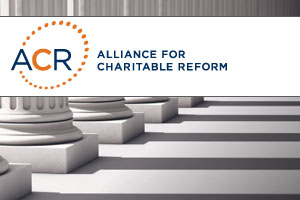Leaders of 19 nonprofits sent a letter to Sen. Max Baucus (D-Mont.), chairman of the Senate Finance Committee and the 12 members of the Joint Select Committee on Deficit Reduction (often referred to as the “Super Committee”), asking them to protect the charitable deduction.
In the letter released yesterday, The Alliance for Charitable Reform (ACR) explains the “potential damage to Americans seeking help from nonprofit services” that limiting the charitable contribution tax deduction.
“We wanted to lay a marker down on the charitable deduction,” said Sandra Swirski, ACR’s executive director and a founding partner of Urban Swirski & Associates, a public policy firm. “The Super Committee is kind of the only game in town right now and we wanted to make sure they understood our interests in case the deduction issue brought into purview of the Super Committee,” she said.
Among those signing on to the letter were United Way, Jewish Federations of North American and the American Red Cross. Absent from the missive was Independent Sector (IS), a coalition of some 600 nonprofits and foundations.
IS President and CEO Diana Aviv said the organization agrees with the sentiment of ACR’s letter but the timing of the organization’s board meetings last week did not allow a chance to review it as they usually do. IS issued its own letter to President Barack Obama and Congress this past summer about the charitable deduction. The letter, which appeared as an ad in the newspaper, Politico, was signed by more than 125 organizations, but no one from ACR.
IS signed on to previous letters by the ACR and the latest version was a fairly expedited process, Swirski said. “I don’t think anything should be read into organizations not being on each other’s letters. I think their [IS] positions is very complementary, or exact, to ours position,” she said.
“Everyone is pulling the rope in the same direction,” said Neal Denton, senior vice president, government relations and strategic partnerships for American Red Cross, downplaying the omission of IS from ACR’s letter. “We’re all very concerned that any alteration to tax treatment to charitable giving would harm the revenue we desperately need,” he said.
The challenge as Denton sees it is the uncertainty about what effect a change to deductions would have on donations. “Any tinkering on this just alarms folks,” he said, adding that for every study that indicates a large impact on giving, there are others that say the opposite.
“We’ve worked really closely with Independent Sector, especially this year, on the charitable deduction, and they’ve organized lots of meetings on Capitol Hill,” said Steven Taylor, vice president and counsel for public policy at United Way World Wide, describing the charitable deduction as United Way’s top federal, national priority.
A project of The Philanthropy Roundtable, the Washington, D.C.-based ACR plans to host nonprofit leaders from the around the nation next Thursday for “Fly in/Speak Out: Preserve Giving” day on Capitol Hill.
A Senate Finance Committee hearing where charitable giving incentives likely will be a discussion topic is expected in the next several weeks. Swirski expects some 40 nonprofit leaders from around the country to be in D.C. for “Preserve Giving Day,” meeting with members of the Senate Finance Committee and Super Committee, as well as some representatives on the House side, in advance of the potential hearing.
Proposals to cap itemized deductions at 28 percent for individuals in the highest two tax rates would have “long-lasting negative consequences for the charitable organizations that millions of Americans rely on for vital programs and services,” according to the ACR letter. The rate is currently tied to an individual’s tax rate.
According to the Internal Revenue Service (IRS) for 2009, Americans took $158 billion in charitable tax deductions.
“To limit the charitable deduction would be to limit our spirit of philanthropy in a time where the demand for charitable services is at it speak, and would adversely affect the less fortunate in our society in deep and direct ways,” the letter states.
IS issued a statement earlier this week on the president’s proposed American Jobs Act. “It’s a matter of how nonprofits are being treated,” said Aviv, as nonprofits were not given the same protections as for-profits, yet the tax incentives for business will be paid for through the reduced deductions. For example, tax incentives available to nonprofits to hire unemployed individuals are only two-thirds of the amount available to for-profit employers. “We’re not asking for more, we’re asking for same treatment any employer,” she said.
The charitable deduction is different from other tax provisions like the mortgage interest deduction, Aviv said, because it encourages individuals to give away a portion of their income to those in need.
The charitable deduction has been under fire multiple times during the Obama administration, each time capping deductions at 28 percent. First, it was the centerpiece of trying to pay for healthcare reform, a year later to help with deficit reduction, then as a fix for the Alternative Minimum Tax (AMT), and now as part of the American Jobs Act.
“The limitation has been the same, each time the proposal has been to pay for different things,” said Taylor.
“The larger issue that United Way is concerned about is just that the charitable deduction seems to be on the table,” he said, whether in a White House proposal or other ideas that reduce incentives for charitable giving, like a report released in the spring from the Congressional Budget Office (CBO).
The chief concern about the concept of capping deduction rates is that it disconnects from tax rate. “Once you do that, the deduction will always be fair game,” said Taylor, adding that if the Bush tax cuts were to expire it would create a greater disparity between income tax rate and the charitable deduction rate. “The long-term whittling away of the deduction is of real concern to us,” he said.
